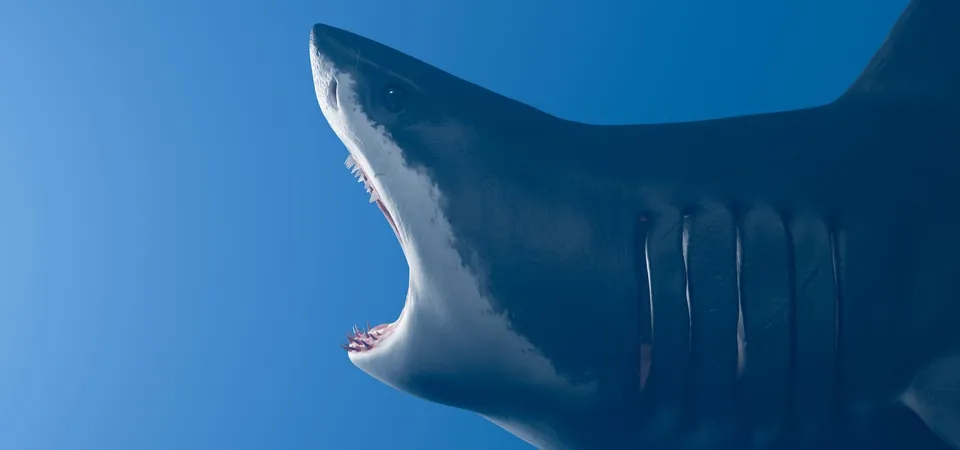
Sharks: Earth's Ancient Guardians - Over 400 Million Years of Survival Against All Odds!
2024-12-08
Author: Jacques
The Origins of Sharks: A 400-Million-Year Journey
Shark ancestors first emerged approximately 420 million years ago during the Silurian Period. Early species like Cladoselache were far removed from the modern shark archetype. According to John Long's seminal work, “The Rise of Fishes: 500 Million Years of Evolution," Cladoselache boasted a torpedo-shaped body that made it a swift predator in the water. With its lightweight cartilaginous skeleton, it had the agility to evade larger predators and hunt primitive fish.
Cladoselache typically measured about 6 feet in length. Interestingly, its teeth were not the iconic serrated structures we associate with sharks today; they were smooth and designed primarily for grasping rather than tearing.
Trees: The Newcomers on Land
While sharks dominated the aquatic realms, land remained largely barren and inhospitable. The first life forms, like mosses and liverworts, emerged around 470 million years ago, but towering trees only appeared much later, in the late Devonian Period, roughly 350 million years ago. The first significant trees, including Archaeopteris, represented a critical evolutionary leap, combining features of ferns and woody trunks, subsequently changing Earth’s landscape and atmosphere.
Trees played a crucial role by producing oxygen through photosynthesis, stabilizing soil, and paving the way for complex terrestrial ecosystems. However, in the grand timeline of life, they remain relative newcomers compared to the ancient lineage of sharks.
Why Sharks Came First: Nature’s Aquatic Advantage
The early emergence of sharks can be traced back to the conducive environment of the Devonian seas. These waters offered a stable medium for life with consistent temperatures and abundant nutrients, allowing for a diverse range of marine species to evolve. In contrast, terrestrial life faced immense challenges, including high UV exposure, water scarcity, and extreme temperature shifts, which delayed the emergence of trees and land-based organisms.
The simplicity and effectiveness of sharks' physiology further expedited their reign in the oceans. Their cartilaginous skeletons, combined with streamlined bodies and efficient predatory strategies, allowed them to thrive in early marine ecosystems. Their adaptability was crucial for survival through dramatic events, such as the Permian-Triassic extinction that obliterated over 90% of Earth’s species.
A Tale of Continuous Evolution and Innovation
Sharks have continuously adapted over eons, showcasing remarkable evolutionary innovations. Their teeth, once primitive, have transformed into an advanced system of replacement—typically organized in rows that move forward as needed. Some species can replace as many as 35,000 teeth over their lifetime.
Fossilized shark teeth provide invaluable insights into their dietary habits and behavior. A notable discovery involved a massive tooth linked to the ferocious Megalodon, which roamed the seas approximately 23 million years ago, potentially reaching lengths of 60 feet, marking it as one of history's largest predators.
An incredible aspect of sharks is their electrosensory system, allowing them to detect minute electric fields generated by the movements of prey. Coupled with acute olfactory abilities and superior swimming skills, these adaptations have cemented their status as top ocean predators.
A Legacy at Risk: The Fight for Survival Continues
Despite their impressive adaptability, sharks are facing unprecedented threats from human activities. Overfishing, habitat destruction, and climate change have pushed several shark species to the brink of extinction. With over 500 species ranging from the tiny dwarf lanternshark to the enormous whale shark, the diversity within the shark family is awe-inspiring, showcasing their tenacity in navigating an ever-evolving marine landscape.
As we marvel at Earth's ancient guardians, it is crucial that we champion conservation efforts to protect these magnificent creatures; otherwise, we may lose a vital link to our planet’s distant past. The battle for their survival is not just a fight for sharks, but for the health of our oceans and, ultimately, our planet.









 Brasil (PT)
Brasil (PT)
 Canada (EN)
Canada (EN)
 Chile (ES)
Chile (ES)
 España (ES)
España (ES)
 France (FR)
France (FR)
 Hong Kong (EN)
Hong Kong (EN)
 Italia (IT)
Italia (IT)
 日本 (JA)
日本 (JA)
 Magyarország (HU)
Magyarország (HU)
 Norge (NO)
Norge (NO)
 Polska (PL)
Polska (PL)
 Schweiz (DE)
Schweiz (DE)
 Singapore (EN)
Singapore (EN)
 Sverige (SV)
Sverige (SV)
 Suomi (FI)
Suomi (FI)
 Türkiye (TR)
Türkiye (TR)